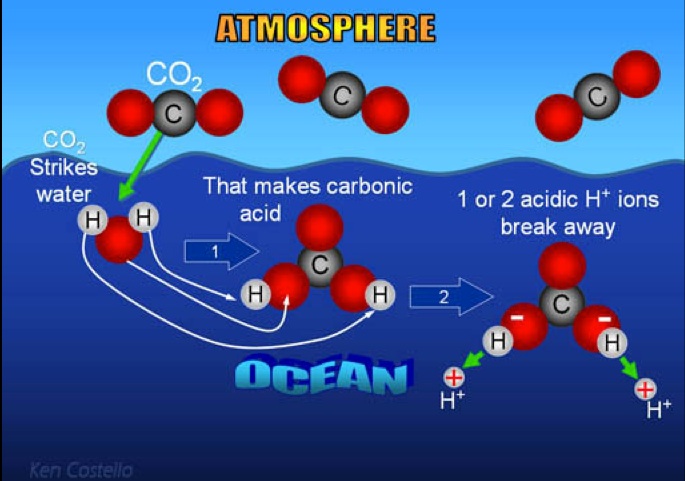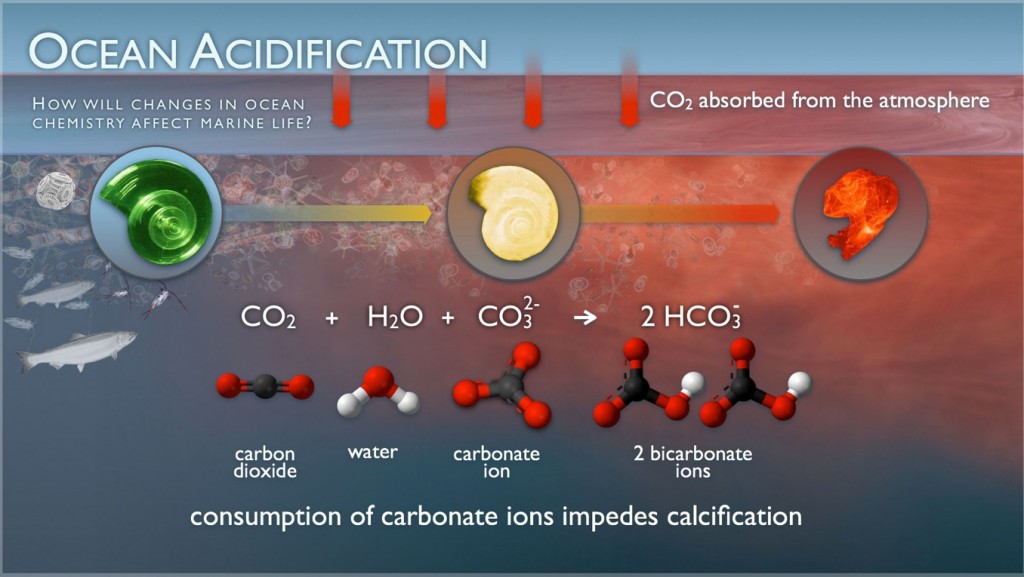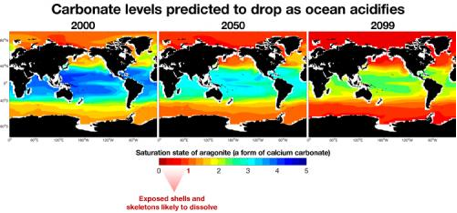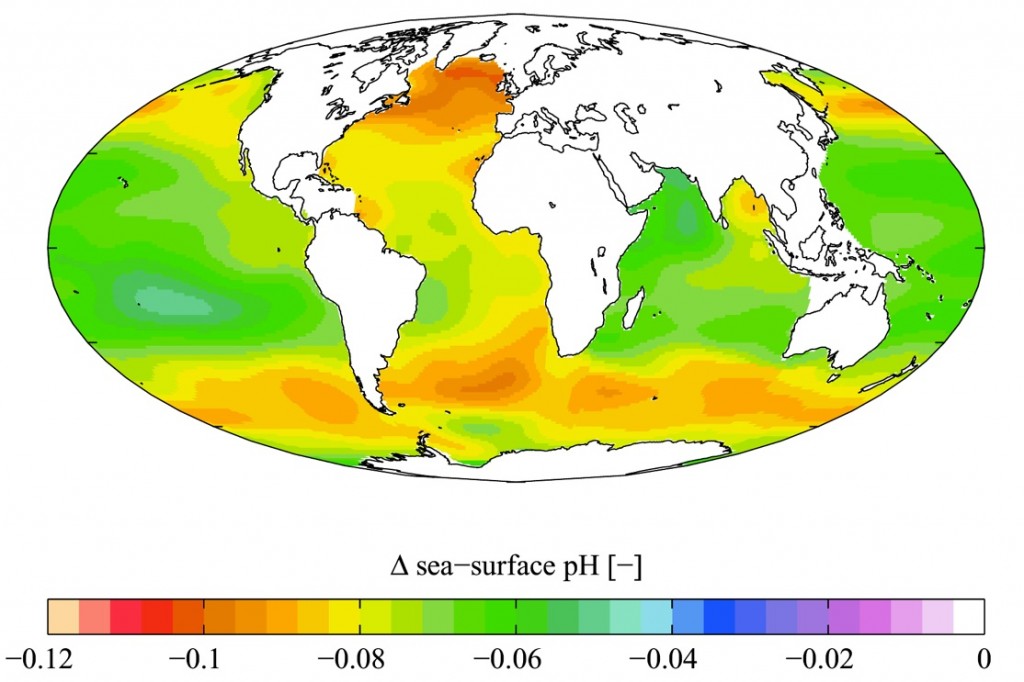Ocean Acidification is occurring on a broad spectrum. Changing pH levels force ocean organisms to reduce their reproductive energy to respond to stress. This will be a Climate Change consequence of hundreds of years duration, even if we halted all carbon use today. We may be forced to make difficult decisions because many of the impacted ocean organisms are microscopic and sensitive to small changes and many of these are producers of a critical life element: Oxygen.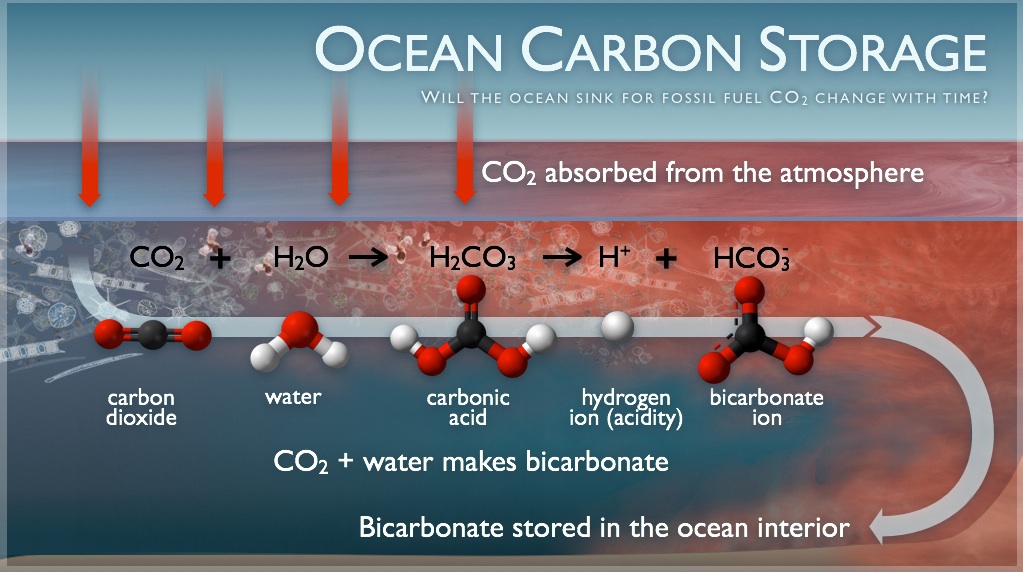 The surface ocean currently absorbs about one-fourth of the CO2 emitted to the atmosphere from human activities, namely from fossil-fuel combustion, deforestation and cement production. When the ocean absorbs CO2 it is beneficial because it keeps it out of the atmosphere, therefore slowing climate change. However, as the CO2 dissolves in seawater, it forms carbonic acid, increasing ocean acidity.
The surface ocean currently absorbs about one-fourth of the CO2 emitted to the atmosphere from human activities, namely from fossil-fuel combustion, deforestation and cement production. When the ocean absorbs CO2 it is beneficial because it keeps it out of the atmosphere, therefore slowing climate change. However, as the CO2 dissolves in seawater, it forms carbonic acid, increasing ocean acidity.
Since industrialization began in the 18th century, surface-ocean acidity has increased by 30%. The warming of seawater also causes chemical changes in phytoplankton that reduce their ability to remove CO2 during photosynthesis. Plankton and micro-algae are responsible for half of the natural removal of CO2 from the atmosphere according to researcher Thomas Mock. The arctic is more susceptible to acidification due to the fact that cold water absorbs CO2 more readily than warm water. As the oceans continue to absorb CO2 the amount they can absorb in the future may diminish. Image below by NOAA.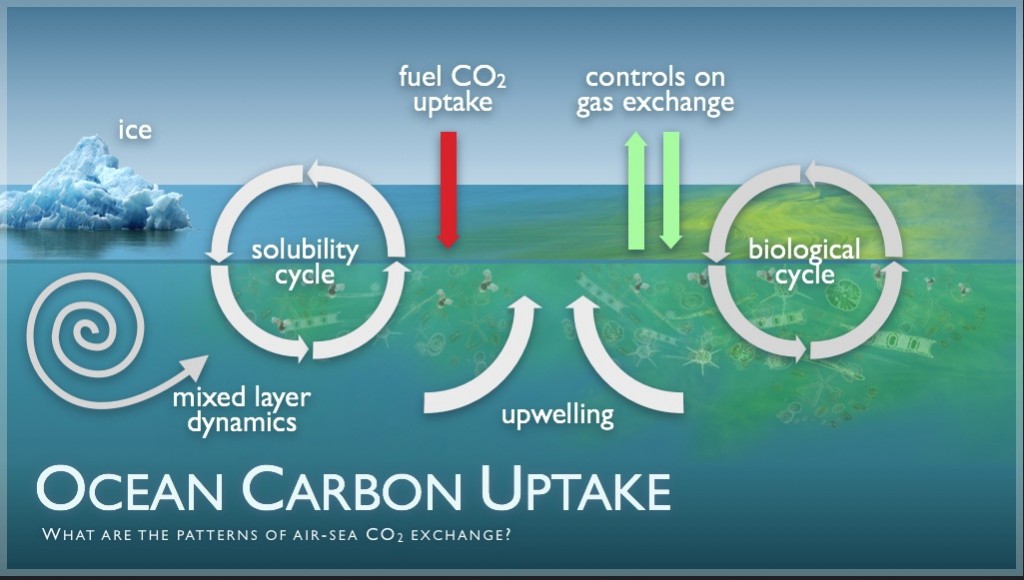
The effects of ocean acidity are a more recent study topic, but have been found to be widespread. The Alfred Wegner Institute compiled data regarding 5 animal taxa: crustaceans, vertebrates, echinoderms, corals and mollusks; all 5 were affected negatively. It has been shown to inhibit shell growth in a variety of species and decrease calcification in coral. Coral and mollusks need calcium carbonate to grow shells; when the ocean acidifies the acid reaction with the carbonate ions and calcium carbonate is unable to be formed. Young and adult fish seem less susceptible to acidification but fish eggs and larvae may be more sensitive and some fish may develop reproductive disorders. Fish stocks may be better able to handle the acidification if they weren’t already susceptible to other environmental stressors such as habitat degradation and overfishing.
Not only are our oceans becoming CO2 saturated but forests show indications of limited future ability to sequester CO2.
http://www.bbc.co.uk/news/science-environment-23712464 European forests carbon sinks getting full
In a lab experiment, a sea butterfly shell placed in seawater with increased acidity slowly dissolves over 45 days.
 Photo by: David Littschwager/National Geographic Society
Photo by: David Littschwager/National Geographic Society
Solutions:
Other than the obvious solution of cutting down on carbon emissions and water pollution there are two other solutions that have had some attention. The first is to pump lime into the oceans where it will then react and combine with carbon dioxide. This solution is in the early phases and a lot more information needs to be gathered before it can be taken seriously. To put enough lime into the ocean to make a difference may also be costly and impractical.
A second solution came about when it was discovered that boney fish create calcium carbonate while going through processes to regulate their body chemistries. A model was developed that estimates fish produce 3-15% of the oceans carbonate and these fish could play a large role in decreasing acidification. The solution comes with reducing over fishing and other stressors to fish populations.
Sources:
-- Astrid C. Wittmann, Hans-O. Pörtner. Sensitivities of Extant Animal Taxa to Ocean Acidification.
Nature Climate Change, 2013; DOI: 10.1038/nclimate1982. Aug 25, 2013
--Doyle, Allister. Reuters. Study: Acidification of Arctic Waters Threatening Fish Reproduction. MSN.com
--Duke University, https://web.duke.edu/nicholas/bio217/spring2010/chang/Solutions.html
--The Monaco Declaration, 2nd International Symposium on the Ocean in a High CO2 World.
--National Geographic. http://ocean.nationalgeographic.com/ocean/critical-issues-ocean-acidification/
Carbon Dioxide is putting shelled animals at risk.
--Smithsonian Institute Ocean Portal, http://ocean.si.edu/climate-change
--Science World Report. Climate Change Impacts Ocean's Chemical Cycles as Temperatures Rise. http://www.scienceworldreport.com/articles/9346/20130909/climate-change-impacts-oceans-chemical-cycles-temperatures-rise.htm. Sep 9, 2013.
Image below shows increasing acidity in high CO2 absorption areas

